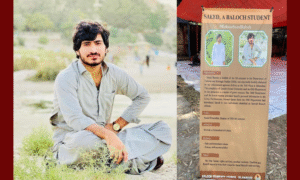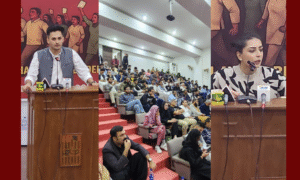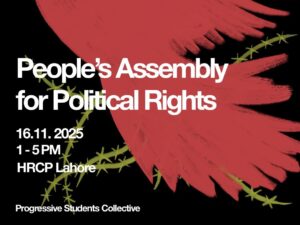The struggle of the Pakistani people to define their collective identity in the aftermath of the Partition in 1947 is well-known. The nascent state, envisioned by Jinnah as a secular pluralistic society that would free the Muslim minority of the subcontinent from the oppression of the Hindu majority, was quick to devolve into a pre-eminently Islamic identity, plunging the people into a still ongoing crisis.
That the Pakistani identity is intertwined with Urdu is undeniable. From the Hindi-Urdu controversy that first led to the Two-Nation theory developed by Syed Ahmed Khan, to the declaration by Jinnah that Urdu was to be the national language of Pakistan,
the story of the Urdu language is perhaps representative of the crisis of identity that faces Pakistan today.
The imposition of Urdu over all other regional languages (most notably Bengali) was in itself an attempt to create an artificial common identity. This was always a bone of contention between East and West Pakistan, culturally and linguistically so different (compared to the differences between West Pakistan and Northern India), leading, among other causes, to the eventual separation and independence of East Pakistan. With the way clear for Urdu, and no real competitor left to challenge it, it should have been a short step to linguistic supremacy. Instead, the language entered a period of steady decline, leading to the present-day situation of English being the main language of the politically and culturally interested members of the new generations.What Urdu is spoken is heavily anglicized, and few can hold a full conversation, on any matter of gravity, without resorting to English phrases.
The adoption in 1949 of the Objectives Resolution by the Constituent Assembly led to the formation, in the 1956 Constitution, of the Islamic Republic of Pakistan, with one religion lifted above all others, and practitioners of other religions reduced constitutionally to a lower status. The continuing presence of the religion in the constitution naturally led to Islam becoming a significant part of what it means to be Pakistani. Coupled with the desire of many Pakistanis, immediately after the Partition,to feel and be seen as separate from the Republic of India, this led to a strange attempt to deny our subcontinental heritage in favour of adopting a purely Muslim identity.
Of course, such an attempt was never prone to succeed, considering its outright inaccuracy. The culture and heritage of what is today Pakistan is, after all, inextricably linked with the cultural tradition of what is now Northern India. The Urdu language, held by many to be the “Muslim” language, during the independence movement and afterwards, is even today spoken in its purest form (by popular consensus) in the Indian city of Lucknow. Literary greats such as Ghalib and Mir were residents of Delhi, and Wali Mohammed Wali, the man who essentially paved the way for modern Urdu literature,lived in what is now India, being born in Aurangabad, Maharashtra and buried in Ahmedabad, Gujarat.
In the attempt to separate Pakistani, “Muslim” identity from the Republic of India, but at the same time connect to an Islamic past, many turned to a Turko-Persian story to explain their own origins. A fascination with Arabic history is also to be seen, although this is not unique to the Muslims of Pakistan. It is important to note that this attempt to explain the cultural heritage of Muslim society in the subcontinent in this manner did not begin after the Partition ( “تھے تو آبا وہ تمہارے ہی “, Jawab-e-Shikwa) but it certainly found renewed strength.
Perhaps the most pathetic attempt to distance Pakistani identity from its actual subcontinental origins is the most recent.
The Prime Minister, Imran Khan, took it upon himself to ensure that the Turkish drama Ertugrul be played on national television, and recommended it to all viewers as “our true history”.
The fact that nothing could be further from Pakistani history is hardly the most pathetic in this case: the series itself is known to be extremely historically inaccurate, considering the dearth of historical records.
A historical contemporary of Ertugrul, Amir Khusrau, is an example of the rich cultural legacy that has been abandoned in the attempt to form the prevailing narrative of Pakistani identity. Few today know much about him, even though his works are exceptionally well preserved. His position as the first person to write in Hindavi (of which Urdu is a register) should have given him a position of high honour among the Urdu-obsessed political class after the partition. Instead, his contribution is being slowly forgotten, as inexorably as the Urdu language itself is declining.
It is my contention that this state of disrepair is caused by the attempt to remove all “Indian” influence from the Pakistani identity. That Urdu is very much a Hindustani (subcontinental) language is an unfortunate fact; that its literary and cultural history has far less to do with Islam than many like to believe is an inconvenience; that some of the greatest works of the language were produced in what is now the Republic of India is ignored; that the word “Hindustan”, when traced etymologically, means “the land of the Indus river”, cannot be admitted; that the word “Hindu” is derived from “Hindustan” and not “Hindustan” from “Hindu” is forgotten; to be “Indian” is to not be Muslim and to not be Muslim is to not be Pakistani, and so the language itself cannot be properly promoted. And so, the crisis deepens, and the fragile Pakistani identity groans under the weight of unacknowledged history. Regional languages, so long ignored in favour of Urdu, teeter on the brink of oblivion; and Urdu, much like the Pakistani identity itself, suffocates under its own Indianness.
The writer is a graduate of NUST, Islamabad.




